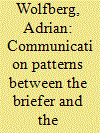| Srl | Item |
| 1 |
ID:
132424


|
|
|
|
|
| Publication |
2014.
|
| Summary/Abstract |
Intelligence professionals called "briefers" provide intelligence information on a daily basis to senior civilian policymakers. Herein is a description of what actually takes place prior to, during, and after the face-to-face interaction. While a body of work exists on presidential briefings, this assessment is unique because it deals with the process of transferring knowledge to policymakers, and specifically from the briefer's perspective. Individuals from the outside, and even intelligence officers or others who have studied intelligence but have not been "briefers," might find some of this material fascinating, yet possibly hard to believe. But those who have been "briefers" will find that this mostly validates their experience."
|
|
|
|
|
|
|
|
|
|
|
|
|
|
|
|
| 2 |
ID:
154325


|
|
|
|
|
| Summary/Abstract |
examines the roles of intelligence officers who present the President’s Daily Brief to the nation’s most senior policymakers. He argues that these officers add to the political landscape by contextualizing meta-information, that is, information about information, that only they can acquire and convey. He concludes that PDB briefers operate as a parallel organization to the intelligence community.
|
|
|
|
|
|
|
|
|
|
|
|
|
|
|
|
| 3 |
ID:
153070


|
|
|
|
|
| Summary/Abstract |
Strategic intelligence is a critical input to national security decision-making. Research indicates decision-making is negatively affected when strategic intelligence creates cognitive problems. In this qualitative study, the opposite was found to be true. Twenty-one very senior landpower generals with command experience in Iraq and Afghanistan were interviewed. Their problems with strategic intelligence – resulting from their perceptions of contradictions – had a positive affect on decision-making. The generals resolved problems using a three-prong, socially embedded, hierarchically diverse, problem solving strategy consisting of self-learning, learning from others, and mentoring others. Such a strategy could be incorporated into professional military education throughout an officer’s career.
|
|
|
|
|
|
|
|
|
|
|
|
|
|
|
|